ASSASINATION IN BROOKLYN PARK AS U.S. POLITICAL DIVIDE TURNS VIOLENT

2


2
By Cynthia Simba and Edwin Okong’o Mshale
When people in the Twin Cities metropolitan area went to sleep on Friday June 13, they probably thought Saturday’s news would be dominated by the “No Kings” protests planned nationwide to resist President Donald J. Trump’s military parade.
But before daybreak, local law enforcement authorities were warning people not to attend the protests because a heavily armed killer was on the loose. Police said the gunman, who was impersonating a police officer, began his shooting spree in the early hours of Saturday when he shot State Sen. John Hoffman, a Democrat, and his wife Yvette in their home in Champlin, a suburban city north of Minneapolis.
An hour and half later, at around 3:30 a.m., the gunman assassinated Rep. Melissa Hortman, also a Democrat and a member of Minnesota state House of Representatives, and her husband, Mark. Rep. Hortman was also a former speaker in the Minnesota House. After killing the Hortmans, he engaged in a shootout with police before escaping. Police began what would become the largest manhunt in the history of Minnesota’s law enforcement, according to Brooklyn Park police Chief Mark Bruley.

The assassination of Hortman and her husband is the latest incident of political violence in a country that is increasingly becoming polarized along race and party lines, and comes less than a year after a gunman attempted to assassinate President Donald J. Trump at a campaign
rally when he was the Republican Party’s nominee for president. Trump released a statement condemning the assassination of Hortman and her husband.
“Such horrific violence will not be tolerated in the United
States of America,” Trump said. “God bless the great people of Minnesota, a truly great place.”

Juneteenth, America’s newest federal holiday, was meant to symbolize a national reckoning with history and a celebration of freedom when President Joe Biden signed the bipartisan legislation into law in 2021. Yet, just a few years later, we find Juneteenth events canceled in cities across Indiana, Illinois, and Oregon, as backlash against diversity, equity, and inclusion (DEI) initiatives intensifies. This is not just an administrative shift, it’s a cultural one. As some seek to erase or diminish Black joy, we must remember that indulging in joy itself has always been an act of resistance.
But Juneteenth also reminds us that freedom in America has never been granted equally. It was delayed for enslaved Black people even after it was declared. Today, for many immigrants, especially Black and brown families, freedom is once again being delayed and denied at borders, in detention centers, and through discriminatory policies. The struggle for liberation is ongoing, and it is interconnected.
Juneteenth itself commemorates the moment when freedom finally reached the enslaved in Galveston, Texas, two and a half years after the Emancipation Proclamation. That delay was not just a historical footnote; it was a wound that echoes across generations. Today, asylum seekers and migrants, many of them Black and brown, live in limbo, waiting for freedom. The delay may look different, but the harm is the same.
At Black Lives Matter, we believe that in the face of attempts to silence and suppress, investing in joy is a radical, necessary form of protest. This Juneteenth, we invite all to join us in celebrating and investing in Black and brown joy as a cornerstone of true liberation, while also standing in solidarity with all who are still waiting for freedom to be realized.
The attacks on DEI and the cancellation of Juneteenth events are not isolated incidents; they are part of a larger movement to strip Black communities, and other marginalized groups, of resources and visibility. In this climate, our resistance must evolve. Our response cannot be limited to protest alone. It must also include reclaiming the right to thrive, to play, and to experience joy.
From the earliest Juneteenth celebrations to today’s block parties and art festivals, play and happiness have been tools for survival and defiance. For Black and brown communities, joy has always been revolutionary. BLM was founded in 2013 in response to unspeakable tragedies, ones where ruthless oppression, abuse of power, and brutalities flooded our social media timelines following the murder of innocent young men like Trayvon Martin and Michael Brown. Yet even in mourning,
our communities found ways to laugh, dance, and dream together. The movement’s global resonance is rooted in this duality, the courage to confront injustice, and the audacity to celebrate life.
Juneteenth also invites us to ask, who in America is still fighting for our freedom? Black and brown immigrants, refugees, and asylum seekers face family separation, lack of running water, lack of due process, unsanitary conditions, and more. Undeniably, the same forces that once delayed emancipation, white supremacy, and profit-driven policy, now shape immigration enforcement and send troops when we have the audacity to rise up in cities like Los Angeles.
True freedom is not just the absence of harm; it is the presence of opportunity, creativity, and fulfillment. BLM is evolving to meet the needs of our most vulnerable, investing in programs that provide access to art, wellness, and community spaces. We will continue to advocate for divestment from police, prisons, and punishment paradigms while also pushing for investment into justice, joy, and culture.
More recently, we’ve invested in youth sports programs in local communities and abroad, from Brooklyn, New York to Ghana, to ensure we are building from the inside out and advocating for the most vulnerable. We are guided by the wisdom of our ancestors, who, even in the darkest times, found ways to nurture hope and rebuild. This Juneteenth, let us do more than remember the past. Let us build the future. Migration is a declaration of hope. Just as Black Americans fled the South during the Great Migration seeking dignity, safety, and opportunity, today’s immigrants are doing the same. We call on local leaders, philanthropists, and allies to invest in Black communities and to stand in solidarity with all who are still fighting for freedom. The right to give, to gather, and to celebrate, are as vital as any policy change.
Let this Juneteenth serve as a vision for what America can become. In the face of those who would turn back the clock, we choose to move forward, fueled by the power of joy as resistance. This year, and every year, let us honor Juneteenth with bold action and the unwavering belief that freedom includes the right for everyone to play, to dream, and to live fully.
Will you join us in shaping the future on our own terms, until all are free?
Cicley Gay is the board chairwoman of Black Lives Matter Global Network Foundation. She wrote this for the National Newspaper Publishers Association (NNPA)’s BlackPress USA, that represents the over 200 Black-owned newspapers in America

By
SAN DIEGO (AP) — Adam Greenfield was home nursing a cold when his girlfriend raced in to tell him Immigration and Customs Enforcement vehicles were pulling up in their trendy San Diego neighborhood.
The author and podcast producer grabbed his iPhone and bolted out the door barefoot, joining a handful of neighbors recording masked agents raiding a popular Italian restaurant nearby, as they yelled at the officers to leave. An hour later, the crowd had grown to nearly 75 people, with many in front of the agents’ vehicles.
“I couldn’t stay silent,” Greenfield said. “It was literally outside of my front door.”
More Americans are witnessing people being hauled off as they shop, exercise at the gym, dine out and otherwise go about their daily lives as President Donald Trump’s administration aggressively works to increase immigration arrests. As the raids touch the lives of people who aren’t immigrants themselves, many Americans who rarely, if ever, participated in civil disobedience are rushing out to record the actions on their phones and launch impromptu protests.
across the way they want it to. I think it is sparking more backlash.”
Previously, many arrests happened late at night or in the pre-dawn hours by agents waiting outside people’s homes as they left for work or outside their work sites when they finished their day. When ICE raided another popular restaurant in San Diego in 2008, agents did it in the early morning without incident.
White House border czar Tom Homan has said agents are being forced to make more arrests in communities because of sanctuary policies that limit cooperation with ICE in certain cities and states. ICE enforces immigration laws nationwide but seeks state and local help in alerting federal authorities of immigrants wanted for deportation and holding that person until federal officers take custody.
Vice President JD Vance, during a visit to Los Angeles on Friday, said those policies have given agents “a bit of a morale problem because they’ve had the local government in this community tell them that they’re not allowed to do their job.”
“When that Border Patrol agent goes out to do their job, they said within 15 minutes they have protesters, sometimes violent protesters who are in their face obstructing them,” he said.

Arrests are being made outside gyms, busy restaurants
Greenfield said on the evening of the May 30 raid, the crowd included grandparents, retired military members, hippies, and restaurant patrons arriving for date night. Authorities threw flash bangs to force the crowd back and then drove off with four detained workers, he said.
“To do this, at 5 o’clock, right at the dinner rush, right on a busy intersection with multiple restaurants, they were trying to make a statement,” Greenfield said. “But I don’t know if their intended point is getting
‘It was like a scene out of a movie’
Melyssa Rivas had just arrived at her office in the Los Angeles suburb of Downey, California one morning last week when she heard the frightened screams of young women.
She went outside to find the women confronting nearly a dozen masked federal agents who had surrounded a man kneeling on the pavement.
“It was like a scene out of a movie,” Rivas said. “They all had their faces covered and were standing over this man who was clearly traumatized. And there are these young girls

screaming at the top of their lungs.”
As Rivas began recording the interaction, a growing group of neighbors shouted at the agents to leave the man alone. They eventually drove off in vehicles, without detaining him, video shows.
Rivas spoke to the man afterward, who told her the agents had arrived at the car wash where he worked that morning, then pursued him as he fled on his bicycle. It was one of several recent workplace raids in the majority-Latino city.
The same day, federal agents were seen at a Home Depot, a construction site and an LA Fitness gym. It wasn’t immediately clear how many people had been detained.
“Everyone is just rattled,” said Alex Frayde, an employee at LA Fitness who said he saw the agents outside the gym and stood at the entrance, ready to turn them away as another employee warned customers about the sighting. In the end, the agents never came in.
Arrests at immigration courts and other ICE buildings have also prompted emotional scenes as masked agents have turned up to detain people going to routine appointments and hearings.
In the city of Spokane in eastern Washington state, hundreds of people rushed to protest outside an ICE building June 11 after former city councilor Ben Stuckart posted on Facebook. Stuckart wrote that he was a legal guardian of a Venezuelan asylum seeker who went to check in at the ICE building, only to be detained. His Venezuelan roommate was also detained.
Both men had permission to live and work in the U.S. temporarily under humanitarian parole, Stuckart told The Associated Press.
“I am going to sit in front of the bus,” Stuckart wrote, referring to the van that was set to transport the two men to an ICE detention center in Tacoma. “The Latino community needs the rest of our community now. Not tonight, not Saturday, but right now!!!!”
The city of roughly 230,000 is the seat of Spokane County, where just over half of voters cast ballots for Trump in the 2024 presidential election.
Stuckart was touched to see his mother’s caregiver among the demonstrators.
“She was just like, ‘I’m here because I love your mom, and I love you, and if you or your friends need help, then I want to help,’” he said through tears.
By evening, the Spokane Police Department sent over 180 officers, with some using pepper balls, to disperse protesters. Over 30 people were arrested, including Stuckart who blocked the transport van with others. He was later released.
Aysha Mercer, a stay-at-home mother of three, said she is “not political in any way, shape or form.” But many children in her Spokane neighborhood — who play in her yard and jump on her trampoline — come from immigrant families, and the thought of them being affected by deportations was “unacceptable,” she said.
She said she wasn’t able to go to Stuckart’s protest. But she marched for the first time in her life on June 14, joining millions in “No Kings” protests across the country.
“I don’t think I’ve ever felt as strongly as I do right this here second,” she said.
Offenhartz reported from Los Angeles and Rush from Portland, Oregon.
This scratch game’s more fun than a boombox with volume set to the max. You could win up to $88,000 in boss retro style. No Time Machine required. Shoulder pads encouraged.








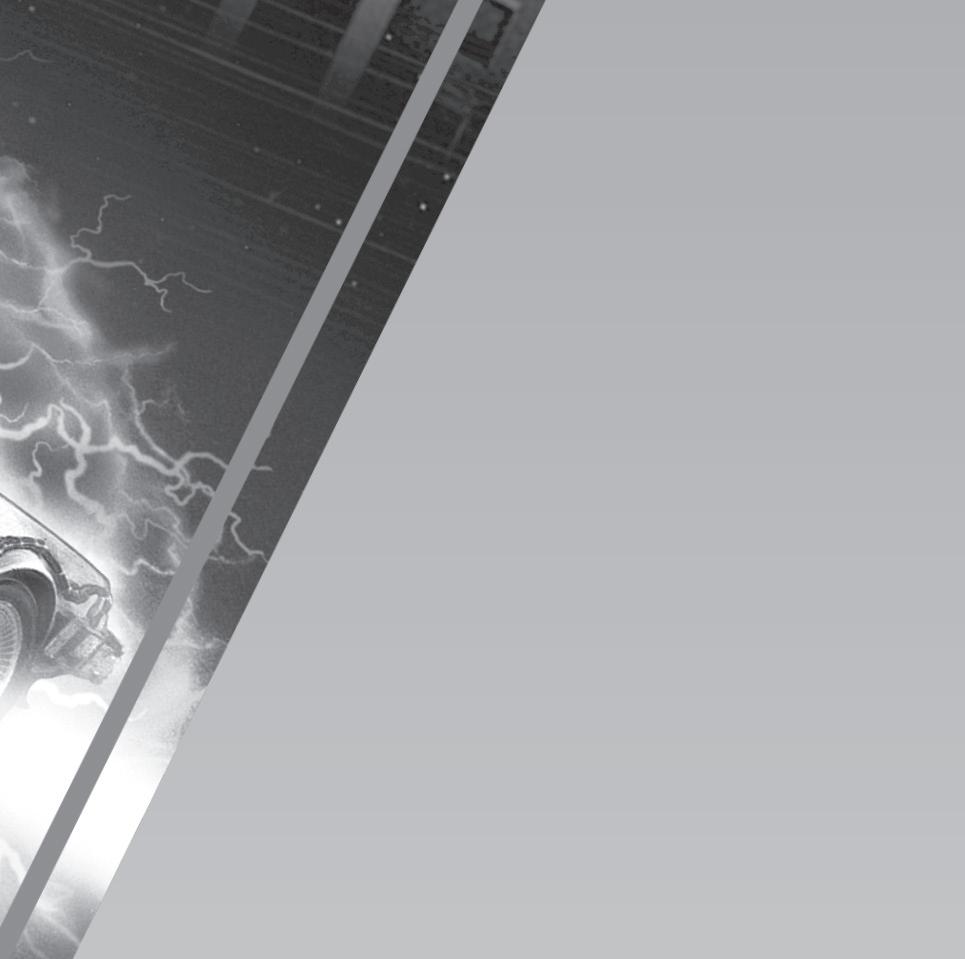
By Lauren Victoria Burke BlackPress USA
Citing Trump’s “attacking our democracy,” the National Association for the Advancement of Colored People (NAACP) will not invite President Donald Trump to its national convention this year.
The decision marks the first time that America’s oldest civil rights organization will exclude a sitting president at its convention.
In a statement on the evening of June 16, the reasons were made clear. “Donald Trump is attacking our democracy and our civil rights. He
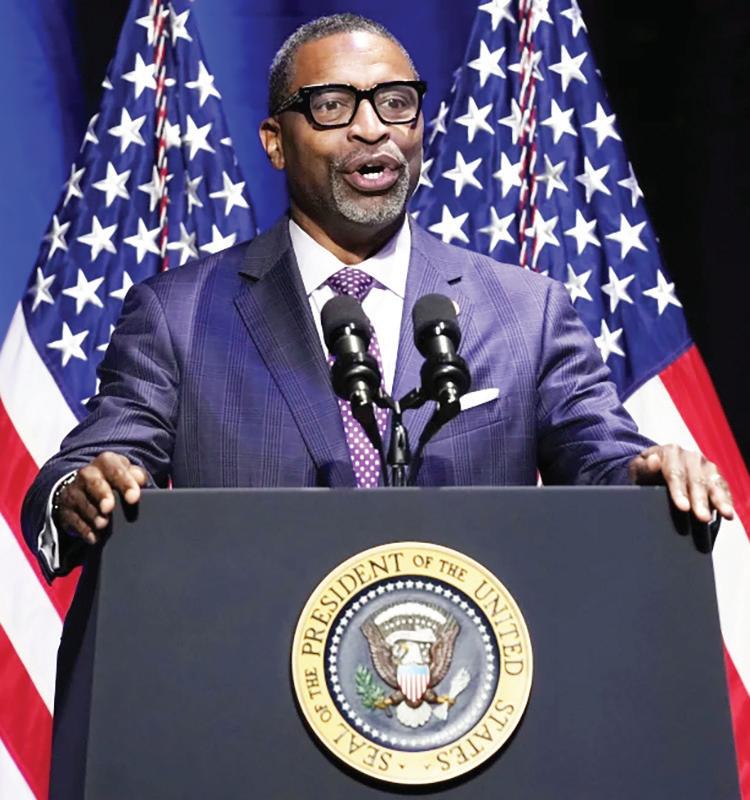
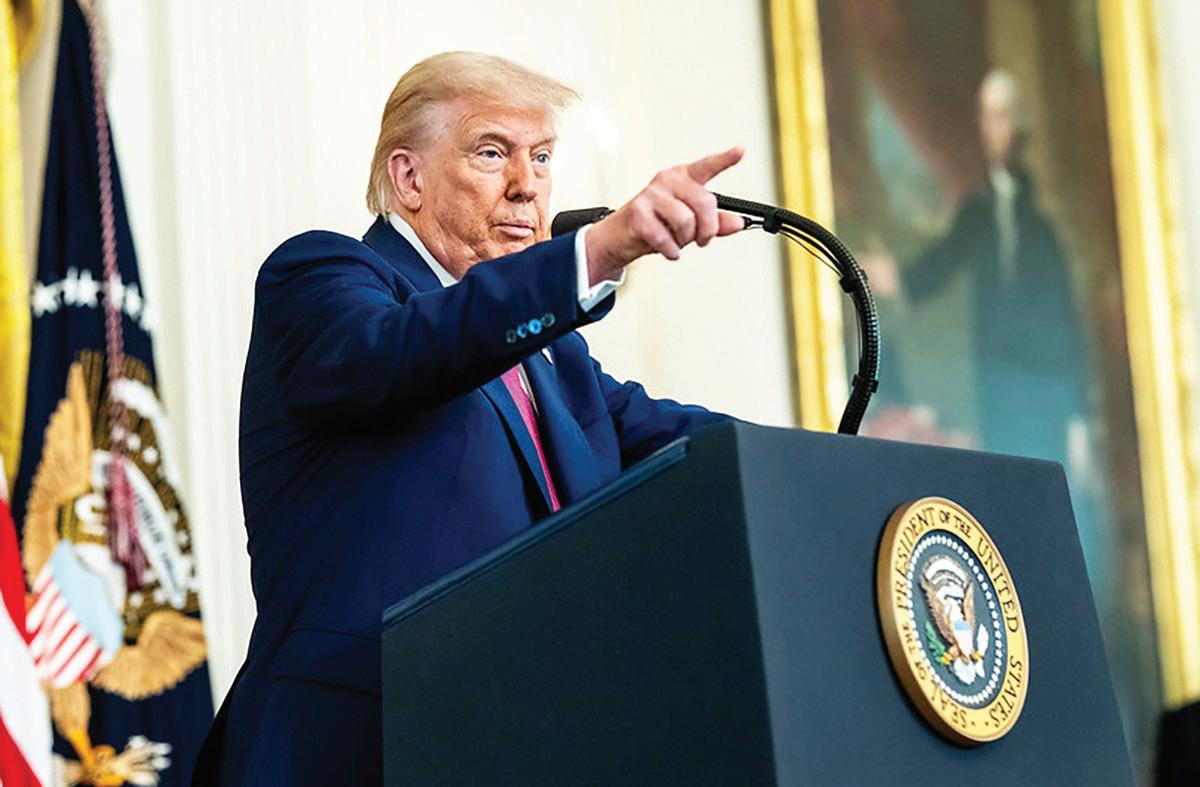
believes more in the fascist playbook than in the U.S. Constitution. This playbook is radical and un-American. The president has signed unconstitutional executive orders to oppress voters and undo federal civil rights protections; he has illegally turned the military on our communities, and he continually undermines every pillar of our democracy to make himself more powerful and to personally benefit from the U.S. government,” the statement from the NAACP read in part.
The NAACP’s statement referred to President Trump’s recent decision to send the National Guard to Los Angeles after protests against ICE detentions and abductions sent fear through
Get Medicare + Medical Assistance (Medicaid) in one plan.
parts of the Los Angeles community.
The White House responded to the NAACP’s June 16 statement. “The NAACP isn’t advancing anything but hate and division, while the President is focused on uniting our country, improving our economy, securing our borders, and establishing peace across the globe. This is the same vision for America that a record number of Black Americans supported in the resounding reelection of President Trump,” stated White House spokesperson Harrison Fields said in a written statement.
Since he took office in January 2025 for his second term in The White House there has been a clear
anti-Black policy focus pushed by the Trump Administration. Trump and members of his cabinet have constantly attacked diversity and inclusion since taking office.
The Trump Administration has also fired without cause several Black officials in top roles such as General CQ Brown, who was Chair of the Joint Chiefs of Staff, and Dr. Carla Hayden, who served as the Librarian of Congress. It was reported in early April that books on racism civil rights and the Black experience have been removed from the library at the U.S. Military Academy in Annapolis. The reason was the stated policy by the Trump Administration against “diversity” and “inclusion.”
“For 116 years, the NAACP has invited the sitting president of the United States to address the NAACP National Convention — regardless of their political party. There is a rich history of both Republicans and Democrats attending our convention — from Harry Truman to Dwight D. Eisenhower, Ronald Reagan, Bill Clinton, George W. Bush, Barack Obama, and beyond. We’re nonpartisan and always welcome those who believe in democracy and the Constitution,” the organization led by Derrick Johnson, also stated.
Republican Presidents Ronald Reagan and George W. Bush addressed racism during their speeches to the NAACP. The organization’s annual convention is one of the largest gatherings of Black leadership in the U.S. each year.
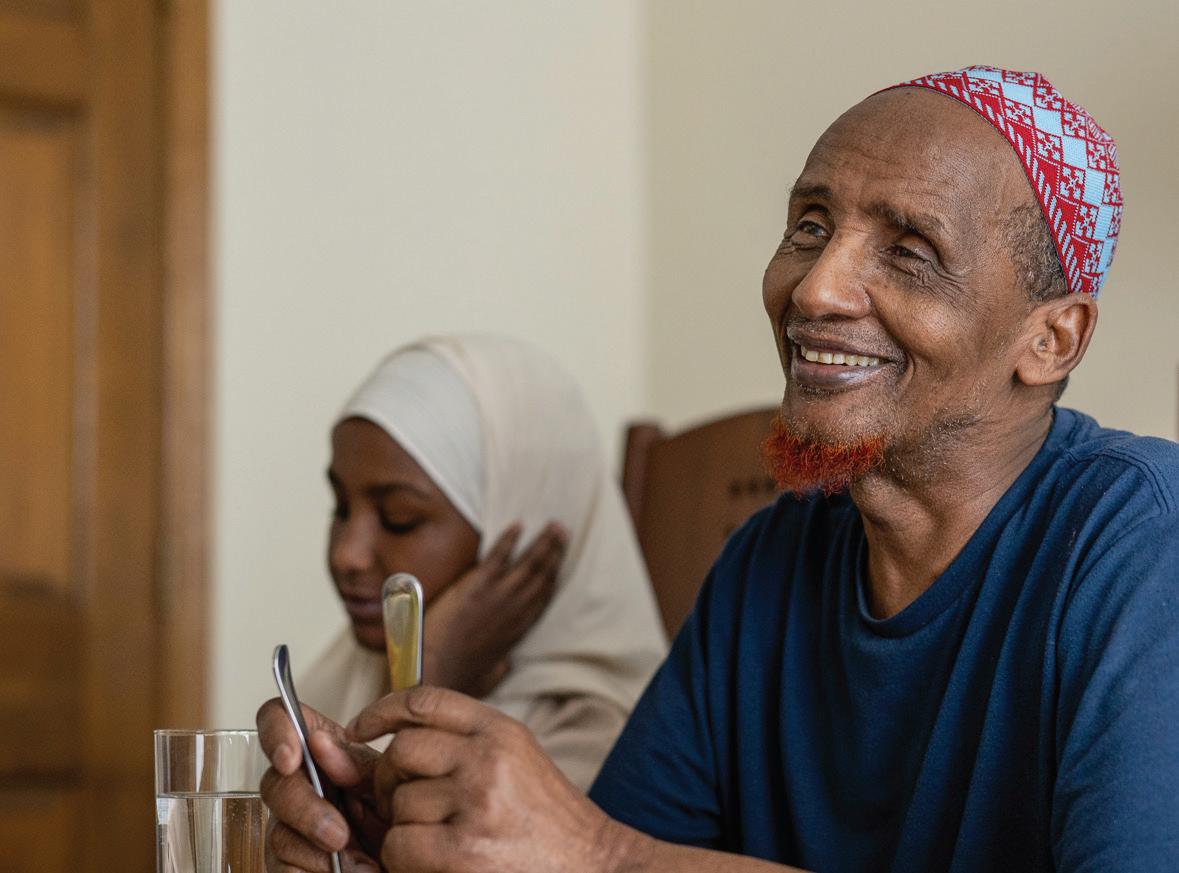

(9/24)
The political shootings are likely to reignite the debate on gun control. The latest data from the U.S. Center for Disease Control (CDC) shows that in 2023 there were nearly 47,000 deaths by firearm. A Pew Research Center analysis of the CDC data revealed that 79% of murders in the United States involved a firearm. While advocates of gun control cite the this as evidence for reform, their opponents argue that stricter gun laws would violate the Second Amendment of the U.S. constitution, which guarantees individuals the right to bear arms.
Hortman Cont’d on Pg. 8
Hortman’s death and condemned the violent acts.
“Today, Minnesota lost a great leader, and I lost a friend,” he said. “We are not a country that settles our differences at gunpoint. We must stand united against all forms of violence – and I call on everyone to join me in that commitment.”
Walz thanked the responding officers for their bravery and swift action and said that the state Bureau of Criminal Apprehension had begun investigation. He promised that the state would spare no resource in bringing those responsible to justice.
“We will not let fear win,” he said. “
The governor said that Minnesota’s thoughts were with the loved ones of
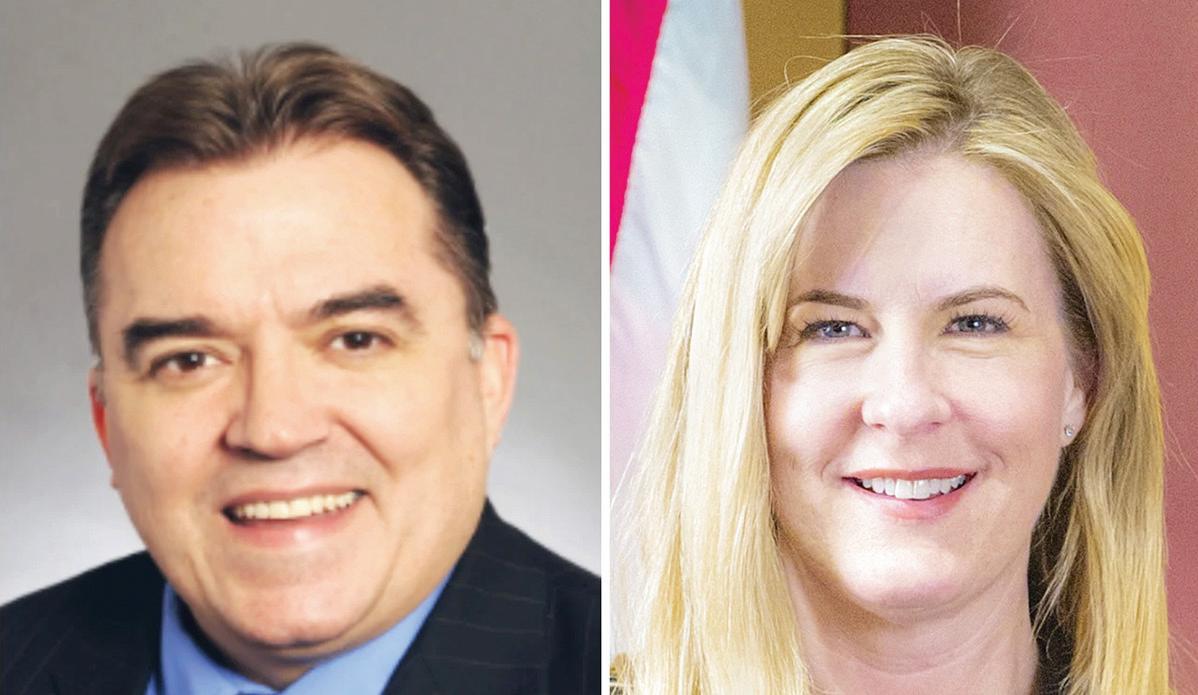
After the shootings, Minnesota Gov. Tim Walz, a Democrat, said he was shaken by the tragedy as he reflected on
the Hortmans, and offered prayers for Hoffman and his wife Yvette, who were recovering in hospital.
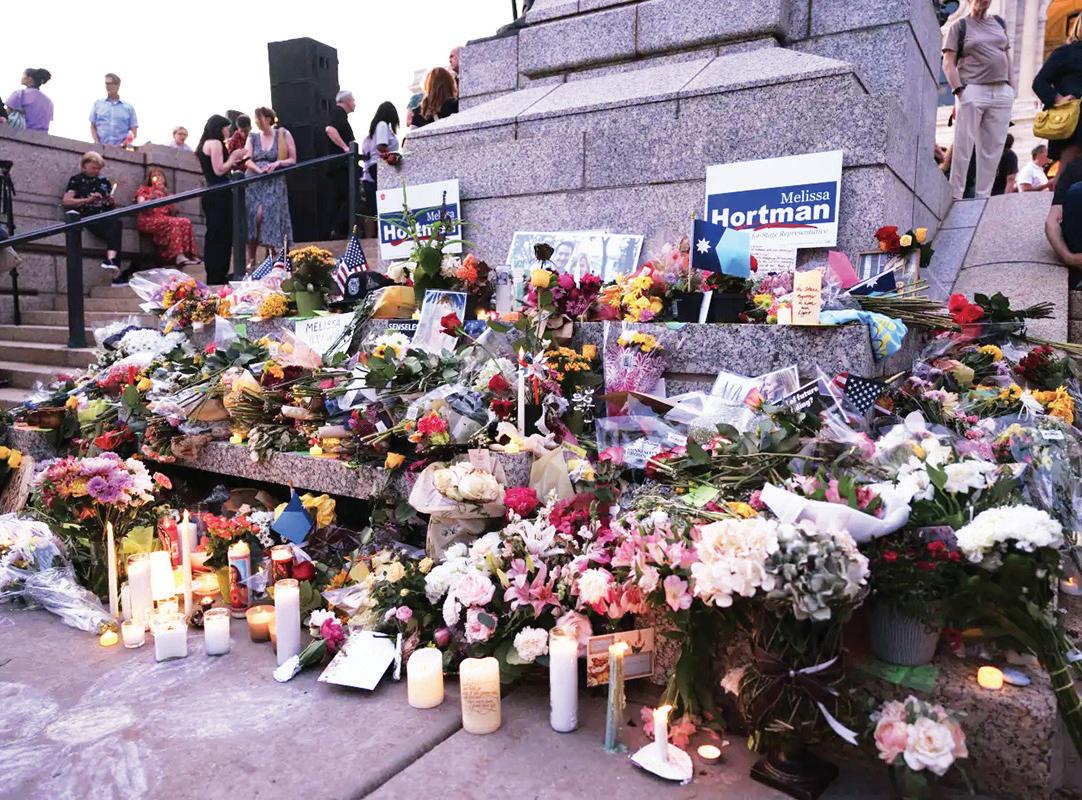
On June 19, the family issued a statement that appeared to have been written by Yvette. She recounted the events of that horrifying night. According to the statement, at approximately 2:00 a.m., the couple and their adult daughter, Hope, were awakened by the sounds of someone pounding on the front door. The man identified himself as a police officer.
“When the door was opened, all three of us were in the entryway,” she wrote. “John initially lunged at the gunman as the weapon was pointed directly at him, getting struck nine times.”
As the senator fell, his wife tried to push the gunman out and shut the door. He shot her eight times. Hope, who was unharmed by the
assailant, rushed to shut and lock the door before calling 911.
“Her brave actions and quick thinking triggered the notice to public safety officials that a politicallymotivated act was potentially underway,” the statement said.
Yvette was released from the hospital, but as of Friday June 20, Sen. Hoffman remained hospitalized in serious but stable condition.
The alleged gunman, who was identified as 57-year-old Vance Boelter, had a list of 45 Democratic state and federal officials in Minnesota,
on Pg. 8














including Lt. Gov. Peggy Flanagan and Attorney General Keith Ellison, U.S. Rep. Ilhan Omar, and other Democrats in Wisconsin, Michigan, and Ohio.
While they searched for him, law enforcement officials told residents in the Brooklyn Park area to shelter in place and not answer their doors, as they launched a manhunt for the alleged gunman.
On Sunday night, Bruley, the Brooklyn Park police chief, announced that police had arrested Boelter at a field his property in Green Isle, a town about 50 miles southwest of Minneapolis. Although the suspect was still heavily armed as he fled, Bruley said police were able to take him onto custody without incident.
In addition to charges of murder
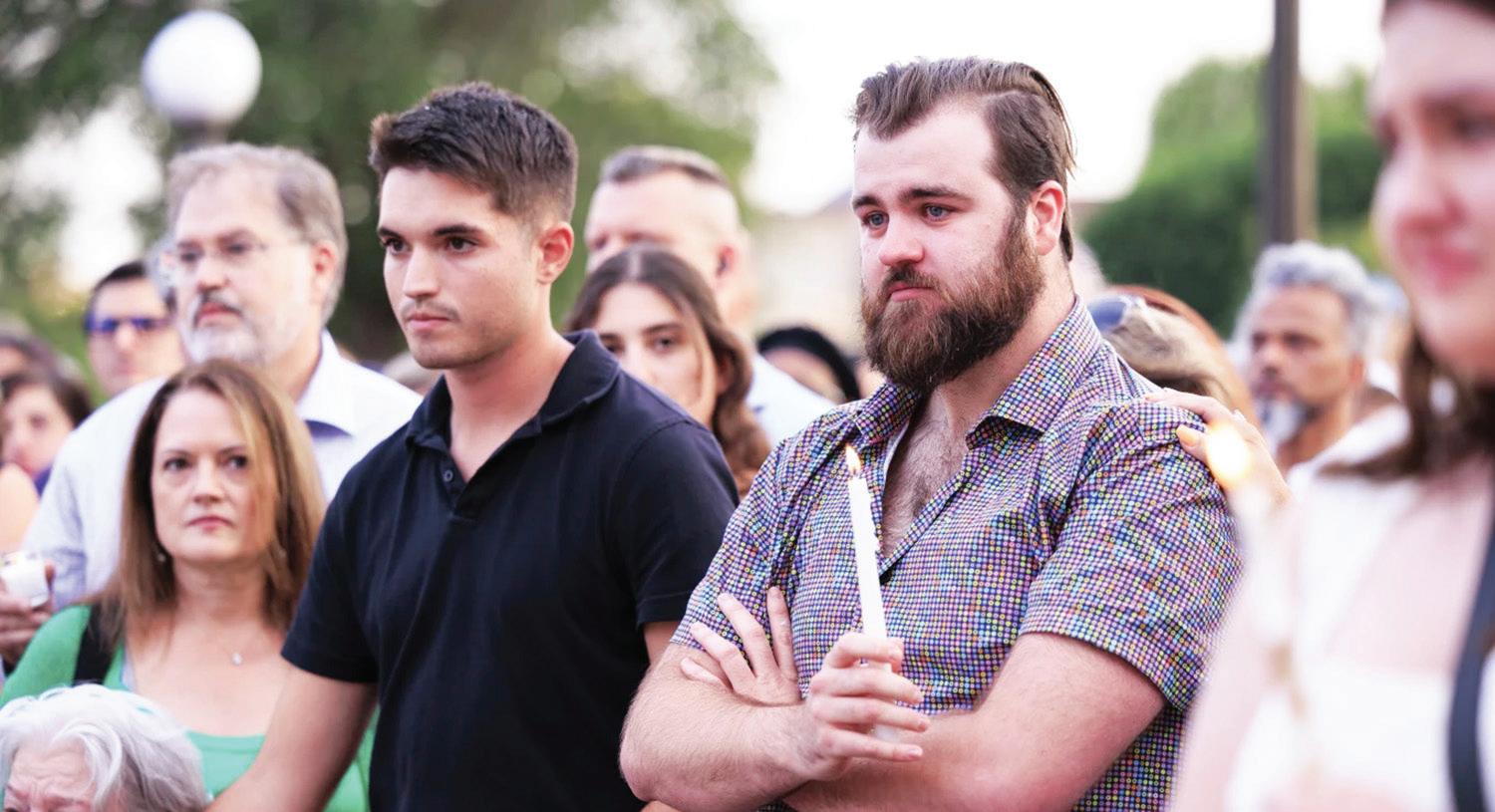
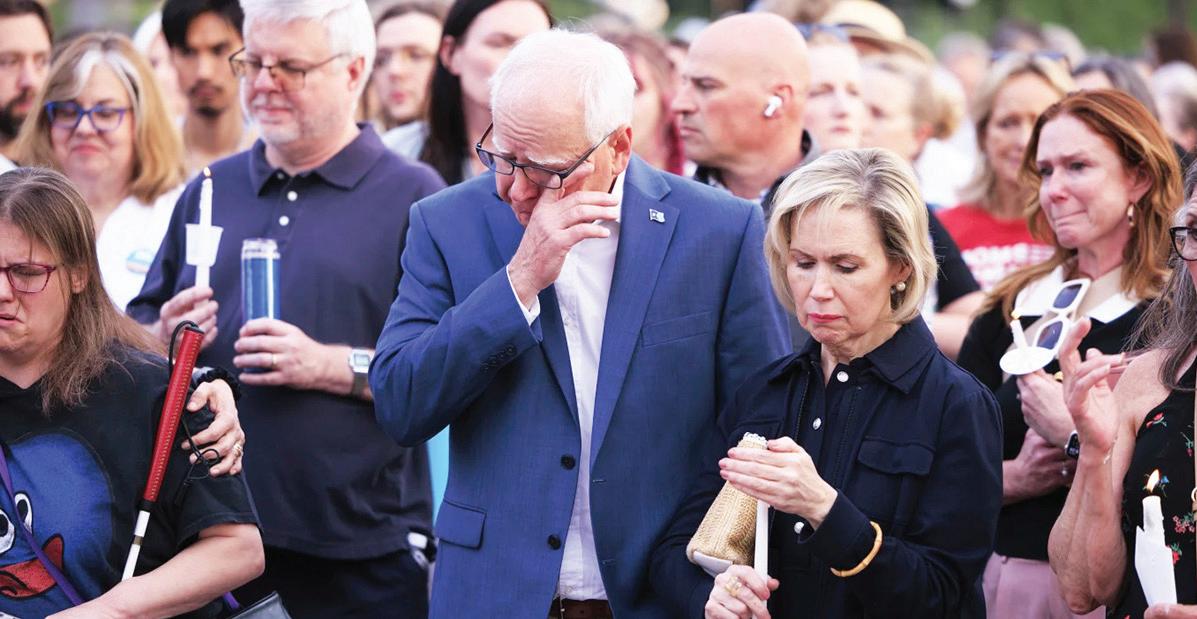
and attempted murder filed by state prosecutors, federal prosecutors also charged Boelter with murder and stalking. If convicted of the federal charges, he could be sentenced to death.
On June 18, thousands gathered at the front steps of the Minnesota State Capitol in St. Paul for a candlelight vigil to honor the legacy of the late Rep. Hortman and her husband Mark. Hortman served as Speaker of the Minnesota House Representatives from 2019 to 2025. Flags were flown at half-mast as the Minnesota Orchestra played a quartet. The vigil also included a Native American drum circle. People sobbed and shed tears as they sang “Amazing Grace.” There were no speakers scheduled on the program, and attendees were asked not to bring signs.
In attendance at the vigil were Hortman’s family members as well as legislators from around the state. Among them was Rep. Huldah Momanyi-Hiltsley, a Democrat who represents District 38A in Brooklyn Park. On the days the news broke, she had to go into hiding while the gunman was still at large.
“It was good to be in community and surrounded by colleagues as we honored the lives of Melissa and Mark” she said. “Melissa was all about people, how we show up for one another, how we treat each other and tonight, we gathered in her name to honor that legacy with love, light, and unity.”
Individuals across party lines came to show solidarity and pay their respects including Dan Beasley, who identifies as a Republican. He came to the vigil carrying a cross as a symbol of peace.
“The cross is a representative of love and healing, that’s why I’m here” Beasley said. “A message of hope, and if we turn to the cross, we can get through whatever adversity that the enemy puts in front of us.”
Noble Fahnbulleh, a Liberian American who works as an information technology analyst at the Minnesota House of Representatives, said he felt it was important to attend the vigil to pay his respects to a leader who directly impacted his life and community. Rep. Hortman played a key role in the Liberian Refugee Immigration Fairness program, which provided an opportunity for certain Liberian nationals living in the United States to obtain lawful permanent resident status and a pathway to citizenship. The program was signed into law in December of 2019 as part of the National Defense Authorization Act for Fiscal Year 2020.
“We’ve lost a great leader, a great person,” Fahnbulleh said. “Coming here to honor her means a lot.”
Rep. Hortman leaves behind a legacy of progressive reform which included free school lunches for children, expanding child tax credits and paid family and medical leave.
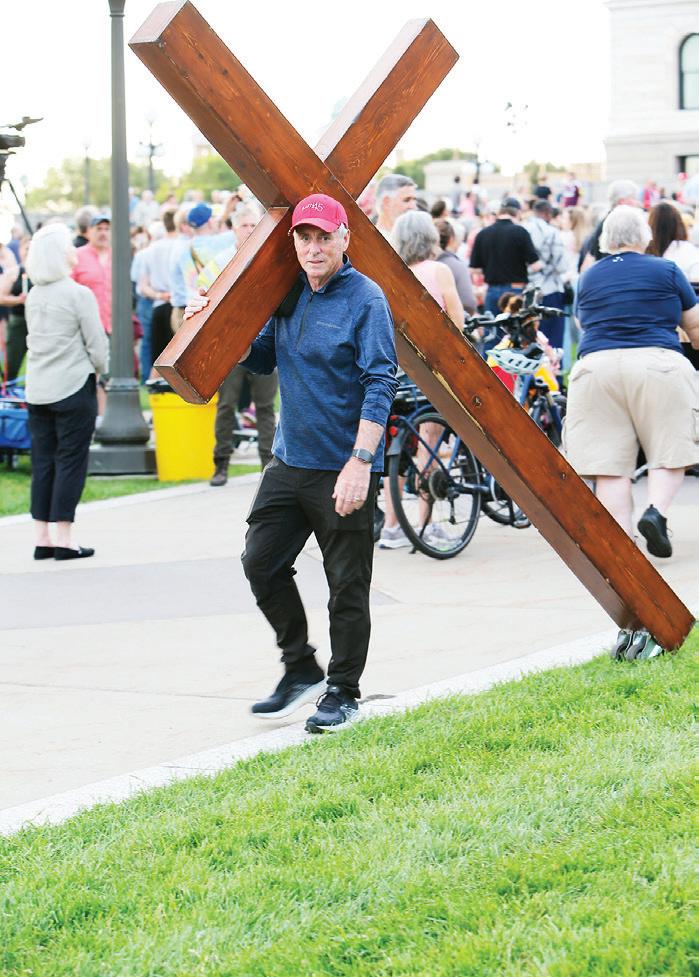
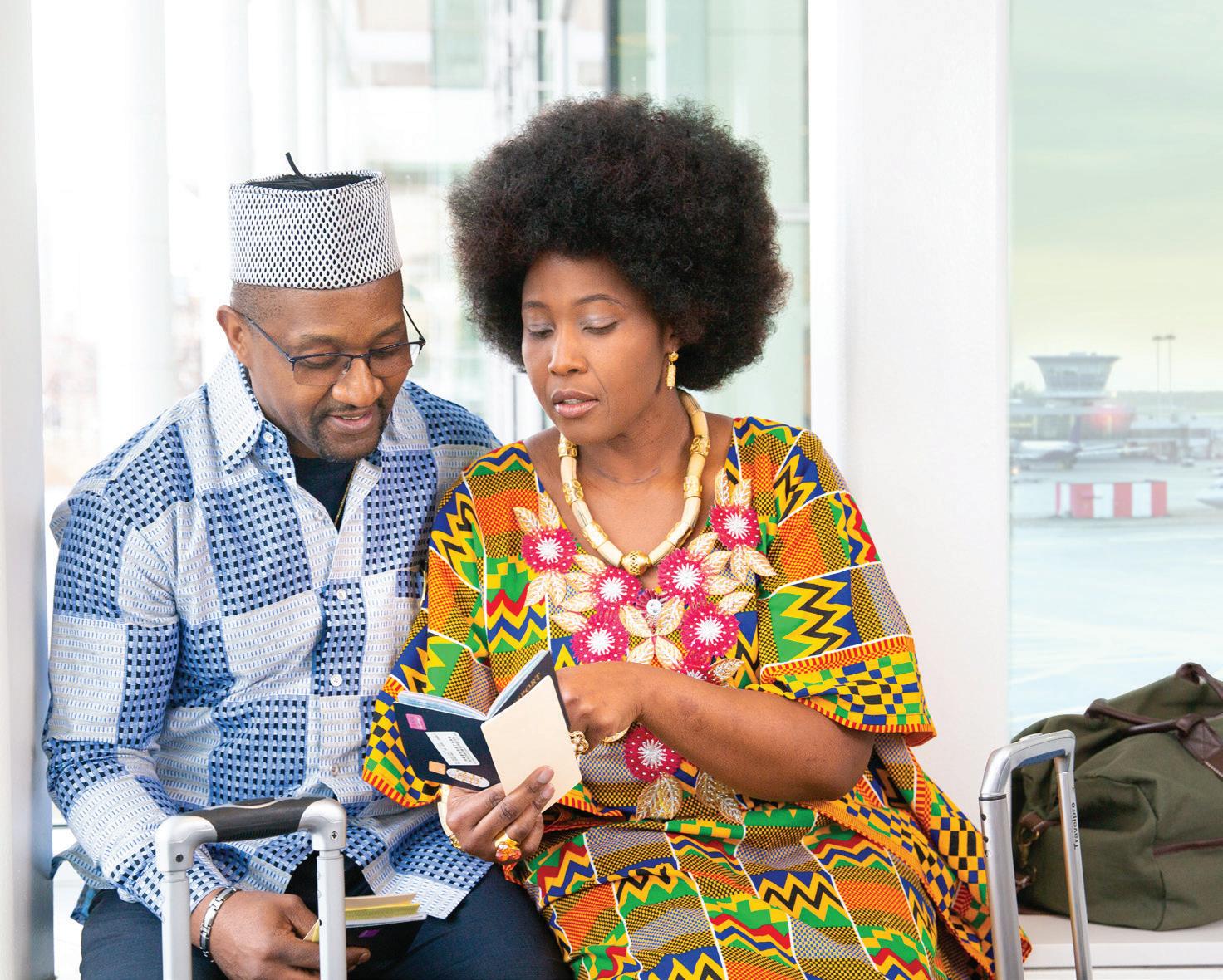
By Fredrick Nzwili Religion News Service
NAIROBI, Kenya (RNS) — The archbishop of Juba in South Sudan called for an immediate end to military operations near places of worship, hospitals and humanitarian aid locations after the brutal killing of a Catholic priest in El-Fasher, the capital of North Darfur, a state in neighboring Sudan.
Cardinal Stephen Ameyu Martin Mulla, president of the bishops conferences of both Sudan and South Sudan, said the Rev. Luke Jumu, a parish priest in ElFasher, and two companions were killed by stray bullets during an intense bombing of the North Darfur capital by the paramilitary Rapid Support Forces on June 13.
“We raise our voices to heaven and to the world to denounce the horrific killing of our beloved priest, Fr. Luka Jumu, and his two faith companions,” Mulla said in a statement on June 17. “Fr. Luka died as he lived: caring for the poor, comforting the displaced, and bringing Christ’s light to the forgotten corners of Darfur.”
Jumu is the first Catholic priest known to have died in the Sudanese civil war, but his death follows a pattern of attacks against church personnel and property across Sudan since the outbreak of the war in April 2023, according to the cardinal.
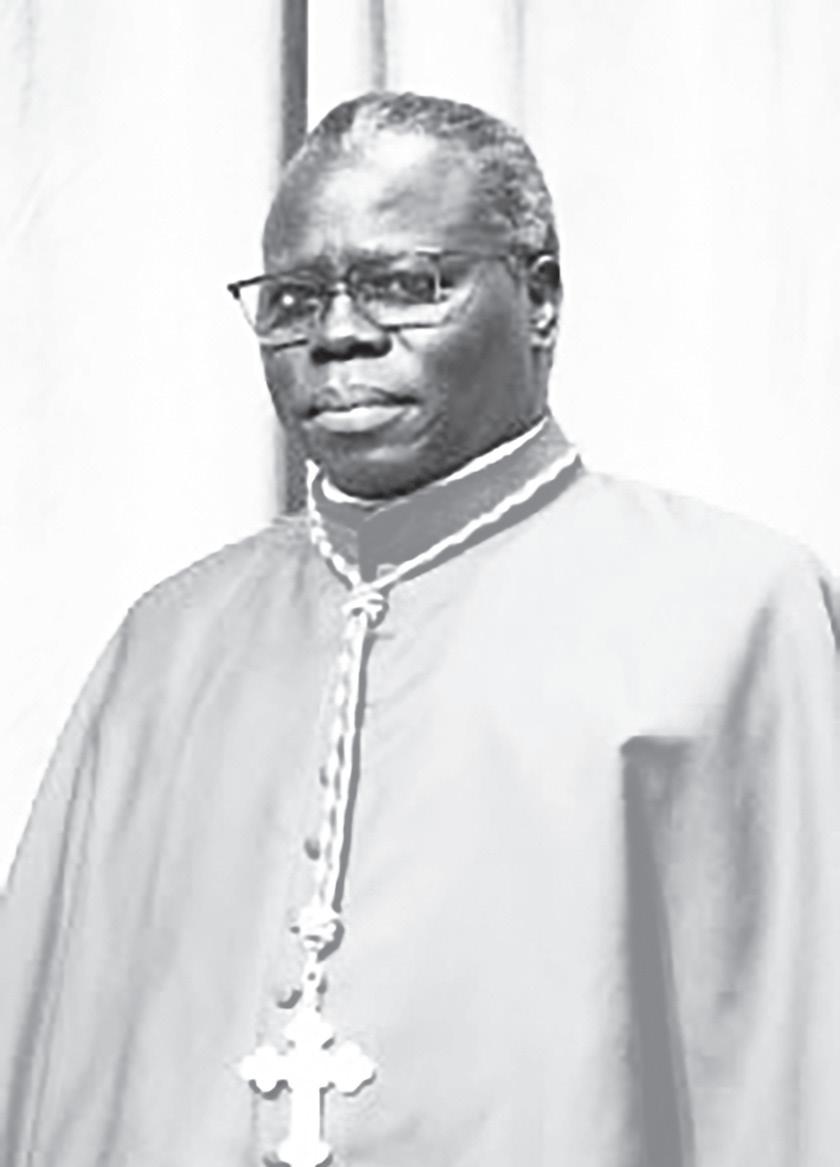
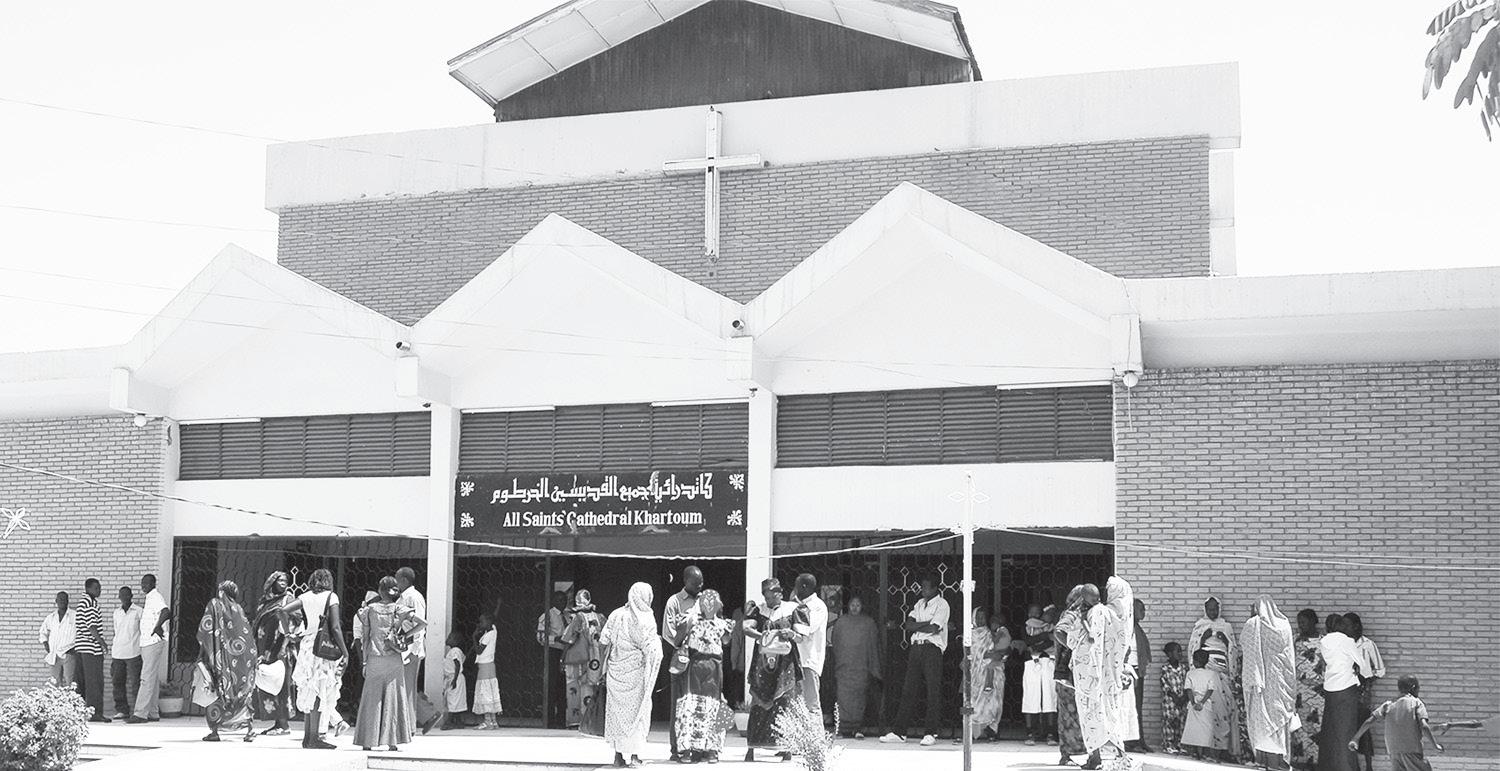
At least 150 churches have been destroyed in the war, according to a statement last year by the U.S. Commission on International Religious Freedom.
Cardinal Mulla said seminaries have been looted, convents abandoned, parishes desecrated and countless faithful scattered in the war, which religious groups have often described as senseless.
The latest rash of attacks on churches in Sudan occurred June 9, when the Rapid Support Forces attacked an Episcopal (Anglican) Church, an African Inland Church and a Roman Catholic Church in El-Fasher, according to Church World Service. The city is under the control of the Sudanese army, but RSF has kept it under siege since 2024.
The war in Sudan, in northeastern Africa, pits the Sudan Armed Forces, led by Gen. Abdel Fattah al-Burhan, against the paramilitary Rapid Support Forces, under the command of Mohammed Hamdan Dagalo, commonly known as Hemedti.
Since the start of the war, some estimates put the human death toll at more than 150,000 from either direct combat or disease or starvation resulting from the
fighting.
“Cholera disease broke out in Khartoum State and Omdurman in particular,” Archbishop Ezekiel Kondo of the Episcopal (Anglican) Church of Sudan told Religion News Service in a recent interview. “Hundreds of lives are lost, while thousands were infected. This is due to no clean drinking water and an unclean environment.”
“I understand there is some very limited help from NGOs,” said Kondo from Port Sudan on his country’s Red Sea coast, where he has retreated from the war.
“Many people are returning to Khartoum (Sudan’s capital) in big numbers despite the situation.”
According to the United Nations High Commission for Refugees’ annual Global Trends Report, Sudan has replaced Syria, Afghanistan and Ukraine as home to the world’s largest displacement of people, with 14.3 million refugees and internally displaced people.
“The international community knows how bad the situation is. If they want help, they can do so,” Kondo said.
More than 90% of Sudan’s 42 million people practice Islam. Christianity is the largest minority religion, accounting for
about 5.4% of the population.
In June last year, the U.N. Security Council passed a resolution calling on the paramilitary to end the siege.
Cardinal Mulla addressed the warring parties, reminding them that the blood of the priest cried out from the ground of Darfur, joining the voices of countless innocent Sudanese of all faiths and walks of life who have fallen victim to this senseless conflict.
“Targeting the clergy and religious institutions constitutes a war crime under international law. We remind you that Sudan’s historical dignity has always been rooted in its religious coexistence,” he said.
Mulla urged the United Nations, the African Union and other nations with influence to use it to end the conflict and push for a humanitarian corridor so that vulnerable civilians, including the displaced priests and religious, can get aid.
“The church’s mission in Sudan remains unshakable. Even in the shadow of death, the light of Christ shines brighter. The church will not flee, will not be silenced and will not abandon its divine calling,” said Mulla

By Banning Eyre Afropop
Goddess, a new musical playing at The Public Theater, is many things: a mystical drama reaching back to the mists of time, a dual love story with both comic and tragic fates, a murder mystery, a bold take on the confrontation between tradition and modernity in a post-colonial African society, and also, a riot of movement, rhythm, vibrant colors, jazzy music and virtuoso vocal performances to rival any opera out there.
The setting is Mombasa, Kenya, where the book-writer Saheem Ali grew up. The action centers around Omari, the son of the city’s conservative governor and a candidate to replace him, and Nadira, a golden-voiced singer who is an earthly embodiment of Marimba, the goddess of music. Nadira is confined to a Mombasa nightclub, the Moto Moto, where most of the action takes place. Omari, fresh from studies in America, is torn between his love of freedom and music (he’s a fine saxophonist), and his conservative parents and fiancée, who consider Moto Moto the nearest thing to Hell on earth.
These themes intertwine as we move between the Moto Moto, Omari’s family home and the lair of an oracle who

receives wisdom from “the gods.” The Moto Moto scenes are electrifying, giving the Shrine scenes in the Broadway musical Fela! a run for their
and Amber Iman
as Nadira. Iman and others have a few diva moments that had the audience I saw on their feet in acclamation.
For all its dimensions and complexity, the story is easy to follow because the balance between music and narrative is skillfully maintained so that one barely misses a word. The music connotes Africa in frequent use of call-and-response vocals and powerful rhythms, enhanced particularly by Senegalese percussionist Aba Diop, part of the on-stage band that accompanies many of the numbers. But the more prominent musical sources are jazz, blues and Broadway recitative. The melodies are intricate and demanding on the performers. This is not the sort of musical where you’ll walk out humming the tunes, but you might want to go back to hear it all again.
Near the end, Omari lauds Swahili culture as a model of multi-ethnic harmony and synthesis. As an Afropopper, I would have loved to hear some East African taarab and Swahili musical strains in the score, but the choice is understandable. All that might have gone right past most audiences.
No one ever accused this writer of being an expert on theater, but for what it’s worth, I suspect this Goddess is headed for Broadway.










